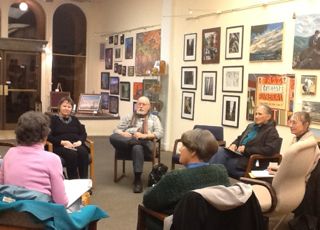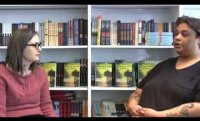P&W-supported presenter Lynn Ciesielski runs the Circleformance Series in Buffalo, NY. Her background is in special education. She has an MS from SUNY College at Buffalo and taught in city schools for over eighteen years. When Lynn retired, she turned most of her energy to poetry. She is currently working on her first full length collection to follow her chapbook, I Speak in Tongues, released by Foothills Publishing in 2012. Lynn's work has also appeared in Yale Journal for Humanities in Medicine, Nerve Cowboy, Slipstream, Wild Goose Poetry Review, Iodine Poetry Journal and many other periodicals.
 What makes your reading series and its events unique?
What makes your reading series and its events unique?
I regularly introduce poets new to the Buffalo literary scene, whether it be due to their youth, out of town status or lengthy dormant periods. By pairing these artists with those who are well-established here, I am able to garner a welcoming audience for them. Additionally, with the help of Poets & Writers’ financial support, I am able to give many of them their first opportunity to earn money doing what they love best.
These measured risks I take have proven very successful. Many of the local poets I know fairly well, who come to the readings, have pulled me aside to mention how much they enjoyed the new writer. They ask where I have found these talents.
Another factor that makes us unique relates to the venue. Our readings take place in my co-host’s art gallery. This provides a visual backdrop which fits nicely with the poetry.
What recent project and/or event have you been especially proud of and why?
On August 13, 2013 I hosted Sara Ries and Elaine Chamberlain. These poets have several things in common. They have strong family ties, they are both phenomenal poets with good standing in our community and most memorably, they travelled to India together the prior winter. Because I know both of them, I was aware that they had written a fair amount of travel poetry related to their trip. I requested that each poet choose their selections from that repertoire. A lot of the attendees and I were especially interested in the section during which each poet read their own poetic version of specific incidents from the trip. These pieces really highlighted their individuality.
As a special treat, I prepared a vegetarian curry and nan khatai (Indian shortbread with coconut and cardamom). The poets and audience members enjoyed a multi-cultural and multi-sensory feast of flavors and words.
What’s the craziest (or funniest or most moving or most memorable) thing that’s happened at an event you’ve hosted?
We generally have a musician who plays before the poets begin. One month he did not turn up and though we were disappointed, we did not make too much of it. Right as the first poet began, the musician called the gallery to speak to the proprietor (my co-host). He did not realize he was on speaker phone and proceeded to explain why he had been unable to make it to perform that evening. The audience burst with laughter and, though the proprietor and I were embarrassed, there was little we could without being impolite.
How do you find and invite readers?
I have a pretty big network of poet friends/ acquaintances in Buffalo and Western New York and surrounding areas. When I run out of ideas, I consult with my co-host who is not only a visual artist and gallery proprietor but a poet and writer as well.
When I am interested in featuring a poet I generally contact him/her via email or telephone.
How do you cultivate an audience?
At each reading I announce the next several dates along with the features. We advertise in local papers and on the Meridian West Art Gallery’s facebook page. I also send out a mass mailing to everyone in my poetry network.
What do you consider to be the value of literary programs for your community?
Buffalo is a very depressed area which has experienced a mass exodus. However, our arts community continues to thrive. I think literary programs elevate morale and give people varied opportunities to communicate and share at a deep and cathartic level. The literary arts encourage those who feel dismay and enhance joy with profound beauty.
Photo: Lynn Ciesielski Credit: Nicholas Todaro
Support for Readings & Workshops in New York is provided, in part, by public funds from the New York State Council on the Arts, with additional support from the Friends of Poets & Writers.





 To apply, submit a description and sample of the work-in-progress totaling no more than 50 pages, a letter from the publisher confirming that the work is under contract, a brief letter of intent, and an optional sample of previous work totaling no more than 50 pages by May 1. All materials must be submitted electronically to
To apply, submit a description and sample of the work-in-progress totaling no more than 50 pages, a letter from the publisher confirming that the work is under contract, a brief letter of intent, and an optional sample of previous work totaling no more than 50 pages by May 1. All materials must be submitted electronically to 
 Since fall 2008, I have been funded by Poets & Writers to facilitate the Writers Circle, a free public writing workshop that meets once a month in the Lake County Arts Council gallery. Located in rural Northern California, in a valley isolated by mountain ranges, Lake County is both cursed with the problems that come with extreme poverty, and blessed by clean air and breathtaking scenery. Many artists, writers, and professionals retire in Lake County, where they can enjoy mountain trails and the largest natural freshwater lake in the state. Centuries ago, a now-dormant volcano created rich soil in the valleys—soil that now attracts small family farms growing organic produce, walnuts, pears, and wine grapes.
Since fall 2008, I have been funded by Poets & Writers to facilitate the Writers Circle, a free public writing workshop that meets once a month in the Lake County Arts Council gallery. Located in rural Northern California, in a valley isolated by mountain ranges, Lake County is both cursed with the problems that come with extreme poverty, and blessed by clean air and breathtaking scenery. Many artists, writers, and professionals retire in Lake County, where they can enjoy mountain trails and the largest natural freshwater lake in the state. Centuries ago, a now-dormant volcano created rich soil in the valleys—soil that now attracts small family farms growing organic produce, walnuts, pears, and wine grapes. In 2010, participant Lourdes Thuesen started writing a short story about a developmentally delayed girl whose mother was addicted to methamphetamine. As we continued asking her questions about this mother and her history, Lourdes ended up writing a compelling novel with the addicted mother at the center of a complex web of relationships. And, recently, a middle-aged man in a wheelchair has joined us, keeping us enthralled with excerpts from his memoir, So You Want to be a Quadriplegic.
In 2010, participant Lourdes Thuesen started writing a short story about a developmentally delayed girl whose mother was addicted to methamphetamine. As we continued asking her questions about this mother and her history, Lourdes ended up writing a compelling novel with the addicted mother at the center of a complex web of relationships. And, recently, a middle-aged man in a wheelchair has joined us, keeping us enthralled with excerpts from his memoir, So You Want to be a Quadriplegic.
 What makes your reading series and its events unique?
What makes your reading series and its events unique? 

